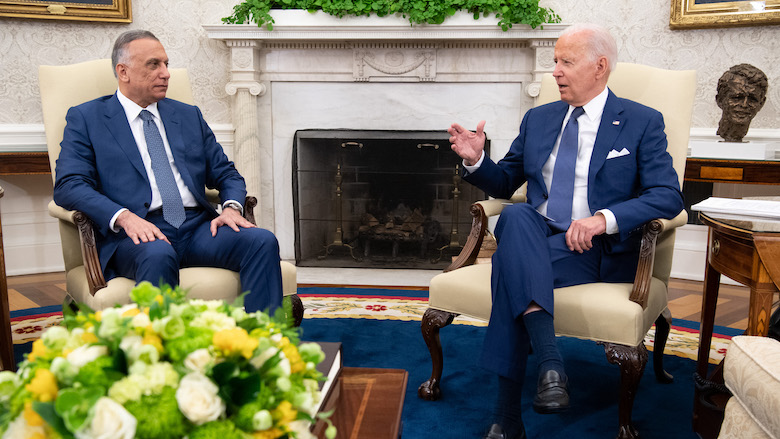Biden, Kadhimi affirm partnership, US forces to remain in Iraq in advisory and training role
No US troop withdrawal was announced during the key meeting between Biden and Kadhimi

WASHINGTON, DC (Kurdistan 24) – During Iraqi Prime Minister Mustafa al-Kadhimi's meeting with US President Joe Biden on Monday, the two leaders repeatedly stated that the partnership between Washington and Iraq is critical and both are committed to maintaining and further developing relations.
No Announcement of US Troop Drawdown
Despite much speculation in advance of the Washington summit, particularly in Arab media, that a major announcement would be made about a further drawdown of US forces in Iraq, none was made.
At Monday’s White House press briefing, a correspondent for Saudi-based media outlet al-Arabiya asked, “On Iraq, what will the number of US forces be by the end of this year, given the drawdown that you’re going to confirm today?”
White House Spokesperson Jen Psaki responded by telling the reporter, politely, that she was mistaken. No such announcement was being made.
“The real announcement today,” Psaki said, is “a change of mission,” rather than a drawdown. “It is more about moving to a more advising and training capacity from what we have had over the last several years.”
“That is what the Iraqi leadership have conveyed they want to see on the ground,” she explained.
US officials have repeatedly stated over the past few months – as Baghdad began to say it would press for an end to the US combat role in Iraq – that US troops longer have such a role. The transition from combat to train, advise, and assist was made last year.
Indeed, Michael Knights of The Washington Institute for Near East Policy made the same point early on Monday in a webinar hosted by The Washington Kurdish Institute.
Iraqi officials “have a timetable [by] the end of the year for the withdrawal of forces that don't exist,” Knights stated, “but they want to have that kind of statement.”
Kurdistan 24 asked the Pentagon on Monday whether the announcement of a change in mission would result in any changes in planned deployments to Iraq.
The Pentagon referred us to the National Security Council, which, in turn, cited Psaki’s exchange with the al-Arabiya correspondent.
The correspondent, who remained fixated on US troop numbers in Iraq, had pressed Psaki with a second question.
“Regardless of the title and what their mission is,” al-Arabiya said, “what’s the number [of US forces] that we expect to be there by December?”
Psaki said she wouldn’t give operational details and suggested the correspondent ask the Defense Department. Thus, there is a closed circle on key questions: the Pentagon refers reporters to the White House, which, in turn, refers them back to the Pentagon.
The reality seems to be that little, in fact, is changing, although US officials say otherwise. The announcement about transitioning to a non-combat role for US forces seems to be a way to make vividly real the present situation, which the Kadhimi government asked for in order to neutralize the issue in advance of the Iraqi elections in October.
Moreover, the repeated questioning on this point seemed to reflect a poor understanding of the situation in Iraq, suggesting it was wrong for Iraq to host US forces, and the sooner that was corrected, the better.
Yet that is not the view of many Iraqis. Rather, it is the view of the Iran-backed militias that operate in Iraq. Kamaran Palani, a Kurdish expert who has done extensive field work in northern Iraq, also spoke at the Washington Kurdish Institute’s webinar.
Palani explained that all the communities in the north of Iraq, including Yezidis, Christians, and even Sunni Arabs, want US forces to remain in the country because they see US forces as a counter to Iran’s influence and the militias that now control much of that region.
That is also, needless to say, the view of the Kurds.
Importance of Strong US-Iraqi Relations for Both Leaders
“Iraq has been a vital partner of the United States for some time now in the Middle East,” Biden said in comments to the press, as he welcomed Kadhimi to the White House.
“I’ve engaged deeply in Iraq for my entire career back in the Senate, as Vice President, and as President,” Biden continued, before noting the service of his late son, Beau, in Iraq for a year with the Army National Guard, “as well as the sacrifices that so many have made to build the US-Iraq partnership.”
“My administration is committed to strengthening that partnership, Mr. Prime Minister,” Biden said, addressing Kadhimi. “Our shared fight against ISIS is critical for the stability of the region, and our counterterrorism cooperation will continue, even as we shift to this new phase we’re going to be talking about.”
Kadhimi responded in kind. “We have a strategic partnership,” the Iraqi Prime Minister said. “I’m happy to be here in Washington to discuss the future of our nation and how to improve this relation between our two countries.”
“Mr. President, I thank you for all the blood and treasure that America has given for a free and democratic Iraq,” he continued.
The KRG leadership has always been open and clear in expressing its thanks and appreciation of the US-led war in Iraq that ousted Saddam Hussein.
Kadhimi’s statement may be the first time an Iraqi leader has done so openly—certainly, it is one of the few times in this reporter’s memory.
“I’m looking forward to working with you, Mr. President,” Kadhimi concluded, “to bring our two countries” closer together “for the benefit of Iraq and the United States.”